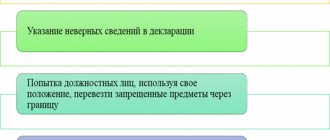ST 193 of the Criminal Code of the Russian Federation.
1. Violation of the requirements of the currency legislation of the Russian Federation on the crediting of funds in foreign currency or the currency of the Russian Federation in large amounts from one or more non-residents to the accounts of a resident in an authorized bank or to the accounts of a resident in banks located outside the territory of the Russian Federation, in the prescribed manner , due to a resident in accordance with the terms of foreign trade agreements (contracts) for goods transferred to non-residents, work performed for them, services provided to them, information and results of intellectual activity transferred to them, including exclusive rights to them, as well as violation of the requirements of the currency legislation of the Russian Federation on the return to the Russian Federation to the resident’s accounts in an authorized bank or to the resident’s accounts in banks located outside the territory of the Russian Federation, in accordance with the established procedure, of funds in foreign currency or the currency of the Russian Federation in a large amount, paid to one or more non-residents for non-imported territory of the Russian Federation (not received on the territory of the Russian Federation) goods, uncompleted work, unprovided services, untransferred information and results of intellectual activity, including exclusive rights to them, committed by a person subject to administrative punishment for acts provided for in Part 5.2 of Article 15.25 of the Russian Code Federation on Administrative Offences, -
shall be punishable by a fine in the amount of two hundred thousand to five hundred thousand rubles, or in the amount of the wages or other income of the convicted person for a period of one to three years, or by forced labor for a term of up to three years, or by imprisonment for a term of up to three years.
1.1. Lost force from April 12, 2022 - Federal Law of April 1, 2022 N 73-FZ
2. Violation of the requirements of the currency legislation of the Russian Federation on the crediting of funds in foreign currency or the currency of the Russian Federation in large amounts from one or more non-residents to the accounts of a resident in an authorized bank or to the accounts of a resident in banks located outside the territory of the Russian Federation, in the prescribed manner , due to a resident in accordance with the terms of foreign trade agreements (contracts) for goods transferred to non-residents, work performed for them, services provided to them, information and results of intellectual activity transferred to them, including exclusive rights to them, as well as violation of the requirements of the currency legislation of the Russian Federation on the return to the Russian Federation to the resident’s accounts in an authorized bank or to the resident’s accounts in banks located outside the territory of the Russian Federation, in accordance with the established procedure, of funds in foreign currency or the currency of the Russian Federation in a large amount, paid to one or more non-residents for non-imported territory of the Russian Federation (not received on the territory of the Russian Federation) goods, unperformed work, unprovided services, untransferred information and results of intellectual activity, including exclusive rights to them, committed:
a) on an especially large scale;
b) by a group of persons by prior conspiracy or an organized group;
c) using a deliberately forged document;
d) using a legal entity created to commit one or more crimes related to financial transactions and other transactions with funds or other property -
shall be punishable by imprisonment for a term of up to five years with or without a fine in the amount of up to one million rubles or in the amount of the wages or other income of the convicted person for a period of up to five years.
Note : The acts provided for in this article are recognized as committed on a large scale if the amount of uncredited or unreturned funds in foreign currency or the currency of the Russian Federation for one-time or multiple currency transactions carried out within one year exceeds one hundred million rubles, and in an especially large amount - one hundred fifty million rubles.
Commentary to Art. 193 Criminal Code
1. The objective side is described through reference to violations of the requirements of currency legislation on the repatriation of funds (see Articles 19 - 20 of the Federal Law of December 10, 2003 N 173-FZ “On Currency Regulation and Currency Control”). The procedure for implementing the requirements specified in the Law is established by subordinate regulatory legal acts.
A prerequisite for criminal liability is a large amount of unrepatriated funds (note to article).
2. The qualifying feature of the use of a knowingly forged document (clause “c” of Part 2) presupposes, if there are grounds for this, qualification in conjunction with Art. 327 of the Criminal Code (the explanations contained in clauses 6 - 7 of the Resolution of the Plenum of the Supreme Court of the Russian Federation of December 27, 2007 N 51 “On judicial practice in cases of fraud, misappropriation and embezzlement” are applicable).
3. The crime will be considered completed from the moment the deadline established for the return of funds in foreign currency from abroad expires.
4. The special subject of the crime is the head of the organization. Individual entrepreneurs, despite the fact that they have the right to carry out export-import operations, due to the direct instructions of the criminal law, cannot be subjects of this crime.
Important!
On April 1, 2022, Vladimir Putin signed 73-FZ, amending Article 193 of the Criminal Code of the Russian Federation. Thus, now it will be possible to initiate a criminal case under the article in question only if the resident has previously been brought to administrative responsibility under Article 15.25 of the Code of Administrative Offenses of the Russian Federation. In addition, the amount of amounts for non-repayment of which entails criminal liability has been significantly increased. A large amount is now considered to be an amount exceeding 100 million rubles, and an especially large amount is 150 million rubles. As the authors of the amendments note, the introduction of such measures was necessary due to anti-Russian sanctions, which made it difficult for many residents to repatriate funds. The law has not yet come into force.
Second commentary to Art. 193 of the Criminal Code of the Russian Federation
1. The regulatory material for the article consists of: Federal Law of December 10, 2003 No. 173-FZ “On Currency Regulation and Currency Control” (hereinafter referred to as the Federal Law of 2003); Instructions of the Bank of Russia: dated March 30, 2004 No. 111-I, as amended. “On the mandatory sale of part of foreign exchange earnings on the domestic foreign exchange market of the Russian Federation,” etc.
2. A criminal law prohibition is established for cases of violation by residents of Russian currency legislation.
In this case, residents are: a) individuals who are citizens of the Russian Federation; b) foreign citizens and stateless persons permanently residing in the Russian Federation on the basis of a residence permit provided for by the legislation of the Russian Federation; c) legal entities created in accordance with the legislation of the Russian Federation, with the exception of foreign legal entities registered in accordance with the Federal Law “On International Companies”; d) branches, representative offices and other divisions of residents specified in clause “c” located outside the territory of the Russian Federation; and others (clause 6 of article 1 of the Federal Law of 2003).
Based on clause 7 of Art. 1 Federal Law of 2003 non-residents include: a) individuals who are not residents; b) legal entities created in accordance with the legislation of foreign states and located outside the territory of the Russian Federation; c) organizations that are not legal entities, created in accordance with the legislation of foreign states and located outside the territory of the Russian Federation; d) diplomatic missions, consular offices of foreign states accredited in the Russian Federation and permanent missions of these states to interstate or intergovernmental organizations; and etc.
3. Currency transactions between residents and non-residents are carried out without restrictions (Article 6 of the Federal Law of 2003). Residents, with the exception of cases provided for by the Federal Law of May 7, 2013 No. 79-FZ “On the prohibition of certain categories of persons from opening and having accounts (deposits), storing cash and valuables in foreign banks located outside the territory of the Russian Federation, owning and (or) use foreign financial instruments”, open without restrictions accounts (deposits) in banks and other financial market organizations located outside the territory of the Russian Federation, in accordance with the personal law of such organizations having the right to provide services related to attracting from residents and placing cash or other financial assets for storage, management, investment and (or) implementation of other transactions in the interests of the resident or directly or indirectly at the expense of the resident (Article 12 of the Federal Law of 2003).
4. In Art. 19 Federal Law of 2003 stipulates the procedure for the repatriation of foreign currency and the currency of the Russian Federation by residents. When carrying out foreign trade activities and (or) when residents provide foreign currency or the currency of the Russian Federation in the form of loans to non-residents, residents, unless otherwise provided by law, are obliged, within the time limits provided for by foreign trade agreements (contracts) and (or) loan agreements, to ensure:
1) receipt from non-residents to their bank accounts in authorized banks of foreign currency or the currency of the Russian Federation due in accordance with the terms of the specified agreements (contracts) for goods transferred to non-residents, work performed for them, services provided to them, information transferred to them and results of intellectual activity, including exclusive rights to them;
2) return to the Russian Federation of funds paid to non-residents for goods not imported into the Russian Federation (not received on the territory of the Russian Federation), work not performed, services not provided, information and results of intellectual activity not transferred, including exclusive rights to them;
3) receipt from non-residents to their bank accounts in authorized banks of foreign currency or Russian currency due in accordance with the terms of loan agreements.
These are the responsibilities of the resident for the repatriation (return) of funds in foreign currency or the currency of the Russian Federation to Russia.
5. The subject of the crime is funds in foreign currency or the currency of the Russian Federation.
Foreign currency includes: a) banknotes in the form of banknotes, treasury notes, coins that are in circulation and are a legal means of cash payment on the territory of the relevant foreign state (group of foreign states), as well as those withdrawn or withdrawn from circulation, but subject to exchange indicated banknotes; b) funds in bank accounts and bank deposits in monetary units of foreign states and international monetary or payment units (Article 1 of the Federal Law of 2003). The currency of the Russian Federation includes: a) banknotes in the form of banknotes and coins of the Bank of Russia, in circulation as a legal means of cash payment on the territory of the Russian Federation, as well as these banknotes withdrawn or withdrawn from circulation, but subject to exchange; b) funds in bank accounts and bank deposits (Article 1 of the Federal Law of 2003).
Both foreign currency and the currency of the Russian Federation are received as a result of foreign exchange transactions carried out by the resident.
6. The objective side is the evasion of obligations to repatriate funds in foreign currency or the currency of the Russian Federation, committed on a large scale.
7. Evasion can be committed in violation of the requirements of the currency legislation of the Russian Federation: 1) on the crediting of funds in foreign currency or the currency of the Russian Federation in a large amount from one or more non-residents to the accounts of a resident in an authorized bank or to the accounts of a resident in banks located outside the territory Russia, in accordance with the established procedure; 2) on the return to the Russian Federation to the resident’s accounts in an authorized bank or to the resident’s accounts in banks located outside the territory of the Russian Federation, in accordance with the established procedure, of funds in foreign currency or Russian currency in a large amount.
8. Both the first and second forms can be expressed variably: 1) in the non-transfer (non-return) of funds received as a result of currency transactions in the Russian Federation, to accounts in an authorized bank; or 2) non-transfer (non-return) of funds received as a result of currency transactions to resident accounts in banks located outside the territory of the Russian Federation.
9. A large amount is determined taking into account two points: 1) the amount of uncredited or unreturned funds in foreign currency or the currency of the Russian Federation can be formed both for one-time and for repeatedly carried out currency transactions within one year; 2) in total it exceeds nine million rubles.
10. The crime is completed from the moment of violation of the rules of the requirements of the currency legislation of the Russian Federation.
11. Subject - a resident or his representative who has reached the age of 16 years, carrying out foreign economic activity.
12. The subjective side is direct intent.
13. In h.h. Articles 11 and 2 establish qualifying criteria.
“Cash out” in Russian: how it works and what the consequences are
Typically, commercial payments are made non-cash. But sometimes money is for urgent current expenses or “gray” salaries. And some entrepreneurs simply want to save money and pay less taxes, or simply receive money for personal use, circumventing the law. The simplest scheme used by unscrupulous businessmen is to turn to one of the “cash-out platforms,” says a former ICR investigator, and now a partner at the Law Office ZKS Law Office ZKS Federal Rating. Criminal Law group 16th place by revenue per lawyer (less than 30 lawyers) 41st place by revenue Company profile Sergey Malyukin. The “performers” will do everything themselves; the “client” is only required to transfer funds via “bank transfer” to the desired account.
Typically, such schemes involve shell companies that do not pay taxes and submit reports with zero figures. They are registered in the names of denominations - homeless people and students who agreed for a small sum to be listed as the founders of companies.
But some businessmen act independently. They register an individual entrepreneur and transfer money there for “fictitious services.” After this, the required amount is withdrawn from the individual entrepreneur’s account and brought to the bank, Malyukin explains the scheme.
There are also newer ways. The head of Rosfinmonitoring, Yuri Chikhanchin, said a year ago that the courts, the FSSP and the notary are used to withdraw funds. A fictitious debt is created, which is repaid through a notary's deposit account or by presenting a notary's writ of execution. In 2019, the volume of such transactions amounted to 5 billion rubles. and exceeded 2.5 times the figures for 2018.
And over the nine months of 2022, the volume of illegal cash withdrawals using executive documents has almost doubled, said Ilya Yasinsky, director of the financial monitoring department of the Bank of Russia. According to him, the volume of such transactions is constantly growing, although in general there is less and less cashing out.
Thus, the security forces will consider a crime a scheme when non-cash money is sent through shell companies through fictitious transactions in order to ultimately withdraw it into cash. And the “customer” uses such operations precisely for illegal purposes. For example, save on taxes, spend “cash” on bribes, kickbacks or things prohibited in circulation.
The Federal Tax Service, in its letter, developed three years ago together with employees of the Investigative Committee, explains how to find out during tax audits that a particular enterprise is purposefully using illegal schemes. Suspicion should be raised by:
- “complex and confusing” transactions;
- moments when a company often spends money on services whose market value is difficult to determine;
- paid consultations on certain issues.
The taxpayer has business relations with companies that have the characteristics of one-day companies: they do not have staff and premises for work, the manager does not receive income, the organization itself opens many current accounts, and also in banks not at the place of registration.
The letter provides advice not only to inspectors who accompany an on-site tax audit, but also to law enforcement officials on what to look for, how to prove guilt and what papers to examine.
Deputy head of the Federal Tax Service for the Sverdlovsk Region, Marina Ryabova, explained how her colleagues contact “cashers”: “During on-site inspections, tax officials request information about the movement of money through bank accounts.” At the same time, they are especially interested in transfers to the accounts of private individuals, and then they deal with them, Ryabova said. For example, the security forces detained the Tambov “cashers” when they found out that the attackers had registered 20 companies that were not engaged in any legal financial and economic activities. The criminals opened personal accounts in banks for 170 citizens, whose passports were fraudulently taken away.
How to be judged for “cash out”
There is no term “cash out” in the legislation, so participants in such schemes are prosecuted under various articles. “Clients” – for non-payment of taxes (Article 199 of the Criminal Code), and the organizers and employees of “cash exchange sites” – for illegal banking activities (Article 172 of the Criminal Code). Additionally, they may be charged with several more offenses, Malyukin lists: “From the illegal circulation of means of payment (Article 187 of the Criminal Code) to the transfer of money to foreigners using forged documents (Article 193.1 of the Criminal Code).”
In the Nizhny Novgorod region, the practice of bringing entrepreneurs who ordered “cash out” to criminal liability under Art. 187 of the Criminal Code (illegal circulation of means of payment). They are punished for using a payment order based on a fictitious agreement.
Sergey Shuldeev, lawyer at AB Q&A
Until mid-2014, there was no unified approach to how to qualify the actions of “cashers” who are not bank employees. Often, the courts considered their crimes as “illegal entrepreneurship” (Article 171 of the Criminal Code), which is punished more leniently than “illegal banking activities” (Article 172 of the Criminal Code), recalls adviser Kazakov and partners Kazakov and partners Federal Rating. group Bankruptcy (including disputes) (high market) group Environmental law group Antitrust law (including disputes) group Natural resources/Energy group Land law/Commercial real estate/Construction group Criminal law 12th place By revenue per lawyer (more than 30 lawyers) 25th place By number of lawyers 27th place By revenue Company profile Alexey Anufrienko: “Usually the courts were limited to suspended sentences.”
- Illegal entrepreneurship (Article 171 of the Criminal Code) as part of an organized group is punishable by a fine of up to 500,000 rubles. or in the amount of wages or other income of the convicted person for a period of one to three years, or forced labor for a term of up to five years, or imprisonment for a term of up to five years with a fine of up to 80,000 rubles. or in the amount of wages or other income of the convicted person for a period of up to six months or without it.
- Illegal banking activity (Article 172 of the Criminal Code) as part of an organized group is punishable by forced labor for up to five years or imprisonment for up to seven years with a fine of up to 1 million rubles. or in the amount of wages or other income of the convicted person for a period of up to five years or without it.
The situation changed six years ago, when the Constitutional Court allowed any citizens to be held accountable under Art. 172 of the Criminal Code (Decision of the Constitutional Court dated July 17, 2014 No. 1743-O). Since then, “illegal banking activities” have been the main ingredients for participants in “cash-out” schemes, says Anufrienko. According to statistics from the Judicial Department of the Supreme Court, the number of people convicted under it is increasing. If five years ago there were only 816 people, then in 2019 4,938 people were sentenced.
True, the punishments for the most part are not the most severe. About half of all sentences are suspended sentences and fines. Only a few hundred people are sent to colonies on these trains each year – for the most high-profile cases. Thus, in Rostov-on-Don a year ago, banker Alexander Grigoriev was sentenced to a real prison term (case No. 1-5/2019 (1-41/2018; 1-432/2017;)). He and his accomplices stole about 2.1 billion rubles. from Zapadny and Doninvest banks. Now he faces nine years behind bars.
The court found that from December 2013 to September 2014 in Moscow and Rostov-on-Don, criminals using forged documents issued obviously non-repayable loans to shell companies registered under dummies. During the investigation, law enforcement officers found and seized property of the accused worth 2.5 billion rubles. Grigoriev played an active role in the Laundromat (“Moldavian scheme”). In this way, Russian clients wishing to withdraw money abroad were served. Bank clerks deliberately made mistakes in payment orders. They changed the details of correspondent accounts of Russian banks in the divisions of the Central Bank with the details of correspondent accounts of the same banks within Moldindconbank, Open Media explained in their investigation. And when the money arrived in Moldova, it was written off based on forged decisions of bailiffs (allegedly Russian companies owed something to Moldovan companies). In reality, dollars were bought with this money, then they were credited to Moldindconbank correspondent accounts at the Bank of New York, investigators from the Ministry of Internal Affairs describe the scheme. As a result, the money ended up in foreign companies controlled by Laundromat clients.
But the Kazan “cashers” got off with suspended sentences and fines, although in three years they cashed out more than 4.5 billion rubles. What saved the criminals from the colony was that they repented and made a deal with the investigation (case No. 1-410/2017). They worked according to a standard scheme: they registered companies in the names of dummy persons, through whom they “drove” the customers’ money. At the same time, the accomplices worked in specially rented apartments, and for the purpose of secrecy they communicated with clients exclusively through Viber and Telegram.
When the scale of criminal activity is serious, then those involved in such cases are also charged with Art. 210 of the Criminal Code (“Organization of a criminal community”). It was on this basis that Sergei Magin and his accomplices, who cashed out 122.2 billion rubles, were convicted. (Case No. 01-0004/2016). Perm investigators also managed to prove an organized criminal group. They uncovered a group that included at least 13 people, including the son of the vice-president of the All-Russian Sambo Federation and the manager of the Sberbank office. The convicts were able to withdraw about 1 billion rubles. (Case No. 22-1083/2019).
The state is fighting against “cashers” and is achieving success in it. This is evidenced by the fact that these “services” are becoming more and more expensive. Their price is already comparable to the tax burden for businesses in the general taxation system.
Sergey Egorov, managing partner of EMPP EMPP Federal rating. group Arbitration proceedings (medium and small disputes - mid market) group Family and inheritance law group Environmental law group TMT (telecommunications, media and technology) group Corporate law/Mergers and acquisitions (high market) group Criminal law 15th place In terms of revenue per lawyer (less 30 lawyers) 33rd place by revenue
According to lawyer Feoktistov and partners Feoktistov and partners Federal rating. Group Criminal Law of Dmitry Danilov, Art. 210 of the Criminal Code, it is appropriate to charge attackers if the “cash-out platform” consists of at least four people who act together and not independently. That is, they have a common cash desk and a single decision-making center. At the same time, according to Art. 210 of the Criminal Code attracts the widest possible range of people, Malyukin emphasizes: “Sometimes even couriers who delivered documents under fictitious transactions are punished.”
The latest trend in tactics and strategies for working in such cases is to bring to justice nominal managers, data about which is in the Unified State Register of Legal Entities. And based on their testimony, they calculate the address of the “cash exchange site”, as well as other participants in the criminal scheme, says the managing partner of EMPP EMPP Federal Rating. group Arbitration proceedings (medium and small disputes - mid market) group Family and inheritance law group Environmental law group TMT (telecommunications, media and technology) group Corporate law/Mergers and acquisitions (high market) group Criminal law 15th place In terms of revenue per lawyer (less 30 lawyers) 33rd place by revenue Sergey Egorov. Although some can be difficult to reach. The modern level of technology allows beneficiaries of such schemes to feel at ease abroad, notes partner Romanov & Partners Law Firm Romanov & Partners Law Firm Federal Rating. group Criminal law Company profile Matvey Protasov.
“Cashers” may also be convicted of illegal creation of companies (Articles 173.1–173.2 of the Criminal Code). We are talking about the registration of shell companies, which criminals use as dummies for their schemes. If investigators establish that criminals bought such organizations ready-made on the black market, then there will be no structure, Danilov claims.
Risks of “criminal” for participants of “cash schemes”
– “Cash-out customers” – the management of the company and its chief accountant. Who is responsible for financial reporting in the company and is responsible for tax evasion (Article 199 of the Criminal Code).
– “First-level executors” are the founders, director and chief accountant of a shell company that was used in a criminal scheme (Article 171 of the Criminal Code and Article 174 of the Criminal Code).
– “Second-level executors” – bank employees (Article 172 of the Criminal Code).
Mikhail Osherov, Chairman of KA Osherov, Oniskovets and partners Osherov, Oniskovets and partners Federal rating. group Criminal law group Dispute resolution in courts of general jurisdiction.
“Cash out” may also appear in the investigation of other compounds. If money received under a government contract is cashed out and it cannot be proven that it was spent for its intended purpose, then this can be classified as fraud (Article 159 of the Criminal Code), says Vladimir Kitsing from Knyazev and Partners Knyazev and Partners Federal Rating. Group Criminal Law A profile is a method of committing another crime.
A similar situation occurred in the Seventh Studio case. According to her former chief accountant Nina Maslyaeva, at the request of Yuri Itin, another person involved in the case, she “set up cashing.” The chief accountant admitted that only 90 million rubles. went to the implementation of the theater project “Platform”, and another 120 million rubles. were kidnapped. Maslyaeva claimed that she appropriated 5 million rubles from this money. The defense was able to confirm that all the performances took place, but the exact cost of them cannot be established. As a result, the accused received suspended sentences specifically for fraud (case No. 01-0033/2020).
According to Danilov, the investigation may impute Art. 159 of the Criminal Code when cashing out money, if he finds out and proves that the recipient of state funds “withdrew” them in order to appropriate them for himself. A hired director who agrees to participate in “cash out” schemes also risks. If the founder of the company declares that such transactions took place without his knowledge, and the money was not returned to the company, then the top manager will be convicted of theft, the lawyer warns.
According to the managing partner Bolshakov, Chelysheva and partners Bolshakov, Chelysheva and partners Federal rating. group Criminal law Company profile of Arthur Bolshakov, recently the founders themselves often seek to initiate criminal proceedings against the hired manager. It can be very difficult to prove that funds were withdrawn at the direction of the owners, the expert states.
It is difficult to investigate such crimes. Some “cash exchange sites” may be “protected” by security forces, Egorov assures. You also need to check a large number of counterparties of fly-by-night companies. Such companies are typically liquidated every three years and their records destroyed, Keatsing notes. The use of foreign companies or firms with accounts in foreign banks will add complexity to the investigation, explains Mikhail Osherov, Chairman of the Osherov, Oniskovets and Partners Federal Rating Agency. group Criminal law group Dispute resolution in courts of general jurisdiction.
What is missing from the legislation?
To effectively combat cash-out, law enforcement agencies have enough powers, Malyukin is sure. Nevertheless, illegal businesses continue to operate, as the tax burden on businesses has not eased in recent years. And the coronavirus crisis will definitely not “convince” entrepreneurs to abandon such tax savings and salary payments “in envelopes.”
Although the Federal Tax Service has issued a letter on how to prove deliberate non-payment of taxes and “cash-out”, this is not enough, Nikita Merkulov, lawyer for Zabeid and partners of Zabeid and partners of Federal Rating, is sure. Criminal Law group. In his opinion, a “blurred” interpretation of the term “cash out” allows you to “see a black cat in a dark room when there is none”: “A law enforcement officer can find a crime where there is none, and a potential attacker will not even know that his actions are illegal.” . To get rid of such risks, the expert suggests deciphering the concept of cashing out at the level of federal law.
- Alexey Malakhovsky
- criminal process
Penalties for evading the obligation to repatriate money
Alternative sanctions under Part 1 of Article 193 of the Criminal Code of the Russian Federation:
- a fine from 200 thousand to 500 thousand rubles (or in the amount of the earnings of the guilty person for a period of 1 to 3 years);
- up to 3 years of forced labor;
- up to 3 years in prison.
If the crime is aggravated by the circumstances described above, the punishment, of course, becomes more severe. For example, for a particularly large amount of unreturned funds, a person can be placed in a colony for up to 5 years. As an additional sanction, a fine of up to 1 million rubles may be applied.





